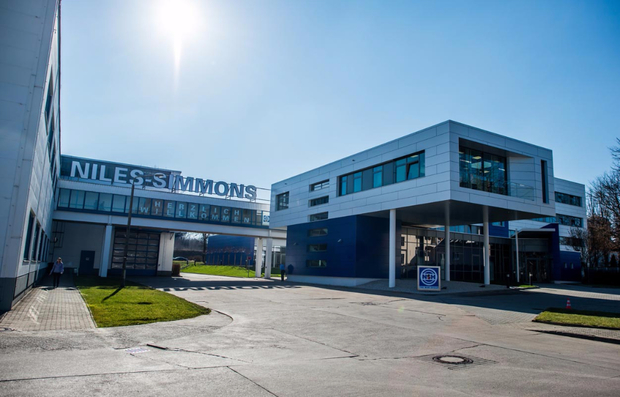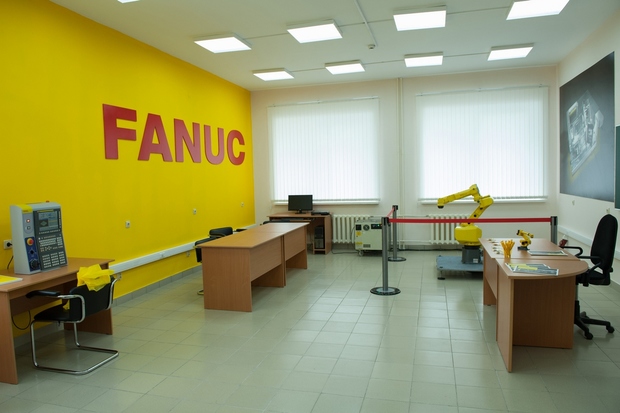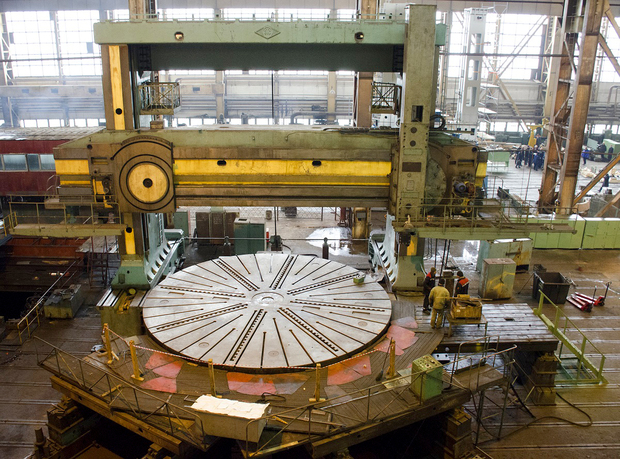Only China left in queue to supply machines to Tatarstan
Russian regions are seeking to create machine tool joint ventures with foreign partners, but the latters want to confine themselves only to the sale of equipment
The direct ban on the supply by European manufacturers of universal and machining machines for the Russian defence industry, active since 2014, has provoked chaotic attempts of regions to localize the machine production in partnership with world leaders. In anticipation of imminent adoption of the state programme on development of machine tool industry until 2030, Tatarstan, as Realnoe Vremya found out, is negotiating with China National Machine Tool Corporation (CNMTC). Moreover, Tatarstan is ready to go to all sorts of concessions, bearing in mind the failure of negotiations with the European leader in the machine tool industry Niles-Simmons-Hegenscheidt.
Following Haier
Amid the scandal with Siemens turbines and extension of international sanctions, that have hit not only domestic defence industry, and counter-sanctions of Russia, the ''centre of gravity'' in the machine tool industry has gradually shifted to the Russian factories, or on foreign manufacturers with ''Russian registration''. Already now, according to the Russian Association Stankoinstrument, about ten foreign companies for machine assembly work in Russia today, and after the adoption of the strategy of machine tool industry development until 2030 at the federal level (to be completed by the end of this year), these industries may be even more — many regions are trying to attract them by privileged tax regime.
As it has become known to Realnoe Vremya, simultaneously with the negotiations with global player in the home appliances market Chinese company Haier, Tatarstan government signed a master contract with China National Machine Tool Corporation (CNMTC). The final response must come after Haier's decision about the deployment in Naberezhnye Chelny of the second project for production of washing machines and an industrial park for suppliers of component parts, that will operate in the mode of TOSER (territory of priority development). The assembly of universal machines can be located in this park.
''We signed the agreement with CNMTC in 2016,'' says an industry source involved in the negotiations with the Chinese. ''They have come to Tatarstan two times, a separate protocol was signed of these meetings. The decisive meeting took place in May, when we directly asked the Chinese representatives whether they intended to locate here.''
However, the question hinged on conditions of the lease of industrial space. ''The conditions that the Chinese ask are difficult to achieve — they want the rent close to gratuitous. We don't know what to do and how to respond to that. In general, it is difficult to negotiate with the Chinese side: they make contact only when they need to,'' he shared information about the course of negotiations to Realnoe Vremya.

Anyway, the authorities of Tatarstan, according to the source, have already made some concessions, offering several accommodation options for the production, so the ''ball'' is now on the side of the Chinese. Deputy Head of Naberezhnye Chelny Executive Committee Eldar Timergaliev, in charge of relations with the residents of TOSER, confirmed to Realnoe Vremya the information about the negotiations, adding that for now the main thing for TOSER is to get the positive response from Haier on washing machines. ''We still have no answer, we are waiting,'' he succinctly explained.
Tractability in relations with CNMTC is explained not only by friendly relations of Tatarstan with Haier, which is the anchor investor of all Naberezhnye Chelny TOSER. The thing is that Tatarstan authorities persistently and not for the first year have been looking for a global partner to organise machine tool production on the territory of the republic. There has not been the result, so, it seems, it has been decided to settle on the choice of CNMTC.
German lessons, or why it did not work out with Niles-Simmons-Hegenscheidt
Over two years, the government of Tatarstan approached to signing of an agreement with the German-Japanese concern Niles-Simmons-Hegenscheidt (NSH). It is the largest machine tool company uniting two enterprises in Germany and one in Japan. It produces 300,000 machines annually. ''I know that Tatarstan has been working up the question with Niles-Simmons on organization of production, and they even were searching a site,'' said one of the leaders of the federal machine-tool company, part of Rostec, to Realnoe Vremya. ''Personally president of the company John Naumann told me about these negotiations: he had plans for Tatarstan. But, judging by the fact that nothing is created, things haven't budged an inch.''
We would like to note that that time this project was patronised by Deputy Prime Minister — Minister of Industry and Trade of Tatarstan Ravil Zaripov. As it follows from the message of the press service of Tatarstan President, on 15 September 2015, Deputy Prime Minister brought to the Kazan Kremlin Naumann and his adviser Harry Bernstein to meet with President of Tatarstan Rustam Minnikhanov. Tatarstan side was represented by Chairman of the Board of Directors of Invent PLC Elbek Safayev and founder of Alsef CJSC Ildar Kadyrov. Apparently, as a production site it was considered the technopolis Invent in Stolbishchi, in the suburbs of Kazan. However, this assumption was failed to confirm — Safayev declined to comment, Kadyrov did not answer to our request.

The reason why the negotiations suddenly terminated is unknown. According to the interlocutor of Realnoe Vremya, a possible reason could be a reluctance of Tatarstan to participate in the financial support of the project. ''I reported about this several times, but the initiative stalled,'' says one of the leaders of the federal machine-tool company, part of Rostec. ''It is a two-way street: once the question of funding arises, the biggest ''plugging'' starts. Investment programmes in machine tool industry are capitalintensive, and the Ministry of Industry and Trade of the Russian Federation does not finance them. They just have no money. They have a plan as well as a subprogramme of machine tool building, but there is zero. Therefore, regions need to have two sources themselves — desire and small funding.''
Coincidence or not, but in November 2015 Ravil Zaripov resigned from the post of Minister of Industry and Trade, which was explained by his fatigue.
The Germans preferred Moscow Zelenograd to Kazan
Meanwhile, the management of Niles-Simmons-Hegenscheidt kept looking for the ''point of entry'' to the Russian market, and after a while this idea was taken up by the Moscow authorities. In the middle of May of this year, they announced the signing of a cooperation agreement with NSH, according to which the Germans localize their production in Zelenograd. ''The project implementation will begin in late 2017. The volume of investments in production will amount to about 750 million rubles, 153 jobs will be created,'' reports TASS referring to Vice Mayor of Moscow Natalia Sergunina. Interestingly, Director General of the Moscow subsidiary of NSD became the same Ildar Kadyrov, who participated in the negotiations in the Kazan Kremlin, and after the assignment withdrew from the founders of Alsef CJSC.
Long before Moscow, a ''lucky ticket'' was taken by neighbouring to Tatarstan Ulyanovsk Oblast. A year ago, German company DNG Mori opened a screwdriver assembly plant of turning and milling machines in the special economic zone Zavolzhye with an investment volume of 70 million euros, and from this year DMG Mori has officially been recognised a Russian manufacturer.
As another machine-tool partner of Tatarstan it was considered a Japanese company FANUC Corporation, which has contracts on the supply of equipment to KAMAZ and to the enterprises of SEZ Alabuga. But it confined itself only to the establishment of a centre of machine tool building in Kazan National Research Technical University that was opened in May this year. ''Their policy is to sell, not to organize the joint venture,'' noted the experts of the industry.

Tatarstan and STAN
Meanwhile, aviation and machine-building enterprises of Tatarstan continue to buy new machines, but of domestic production. Last week, Minister of Industry and Trade of Tatarstan Albert Karimov told reporters that the emphasis is put on the Russian company STAN. ''I cannot say at what amount we buy (it is needed to prepare the figures for procurement separately), but we are interested not only in Japanese, but also Russian machines,'' he said. ''It is the group STAN that produces universal machines.''
Later, Ravil Zaripov (now — aide to Tatarstan President on aviation complex) announced at International Aviation and Space Salon MAKS 2017 that Kazan Helicopters plant and the company STAN discussed a joint cooperation. ''Today we have considered very closely the prospects for development, sales of machinery and equipment with the company STAN – it is already new approaches in the framework of providing services on mechanical processing. This is a revolutionary approach to the solution of many problems for aircraft manufacturing enterprises that need machined processing, which will minimize costs and increase production in the future,'' said the aide to Tatarstan President (quoted by Tatar-inform). However, the press service of STAN did not confirm these words.
The regions are in a hurry to announce the creation of machine joint ventures, as it is now preparing a government decree on development strategy of domestic machine tool industry until 2030, aiming to resuscitate the industry. There are no actual parameters of this programme, but earlier the Ministry of Industry and Trade spoke about a substantial increase in production of machines in Russia by this term — eightfold (up to 64 billion rubles). ''We should be ready for it,'' says Chairman of the mechanical engineering cluster of RT Sergey Mayorov. ''At the exhibition Innoprom we talked with five companies — not everyone can localise the production. There should be a powerful company that has a marketing network and services across the country. Who else has them except from FANUC? FANUC has a service center in Naberezhnye Chelny, Kazan. But they are mostly designed for sale.''

As for the possibility of cooperation with STAN, Mayorov said that the company has excess space, which it would like to fill. ''They do not talk about that. We consider them as a component supplier,'' said the head of the mechanical engineering cluster of the Republic of Tatarstan.